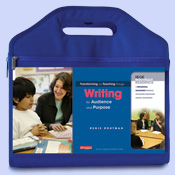 Transforming Our Teaching Through Writing for Audience and Purpose
Transforming Our Teaching Through Writing for Audience and Purpose
How do we help all students write well? How do we get them to willingly revise and edit? In Transforming Our Teaching Through Writing for Audience and Purpose, educators get what they need to raise students' writing achievement by improving teachers' confidence and ability to teach writing in any genre. Over the course of a year, teachers learn a process for teaching writing that can be applied to any curriculum area. They also learn how to embed the traits of writing within a meaningful framework, how to teach and assess the most important qualities for writing achievement, and how to evaluate student writing with an eye to seeing the next steps for each learner.
Transforming Our Teaching Through Writing for Audience and Purpose includes the following professional development sessions and DVD video segments:
Session 1: Welcome to Regie Routman in Residence
Introduces the core beliefs about teaching and learning that support this professional development program and gives an overview of the structure of the sessions.
Session 2: Applying an Optimal Learning Model to Your Teaching
Participants explore a three-part model for teaching and learning that makes teaching easier, more intentional, and more joyful because it scaffolds students' independence.
Session 3: Examining Our Beliefs About Teaching Writing
Participants work together to develop a set of common goals for teaching writing and learn to align well-grounded beliefs with well-grounded practices.
Session 4: Teachers as Writers
Students' writing—and willingness to write, edit, and revise—grows by leaps and bounds when teachers authentically model the process with confidence and ease.
Session 5: Planning for Genre Writing
Teaching students to write in any genre is more effective when we define what it is we want students to know, and then plan lessons from this focal point.
Session 6: Immersing Your Students in a Genre
Participants learn how to guide an immersion process when the class reads and discusses lots of examples in order to develop deep knowledge about the genre's characteristics before writing.
Session 7: Demonstrating Writing
Participants discover how to draft and revise a piece of writing in front of students so they know what to do and say when they write themselves.
Session 8: Public Content Conferences
Participants learn the power of holding a revision conference in front of the whole class so that each student writer is celebrated while all students learn tips for clarifying the content of their writing.
Session 9: Negotiating Editing Expectations
Participants learn to set rigorous, reasonable spelling, punctuation, and grammar standards with students so that they work harder to make their pieces perfect for the reader.
Session 10: Editing Conferences
Everything in this program is about teaching for independence: here, participants learn that the only way students will learn to write better and do well on state writing tests is if we insist on self-directed editing.
Session 11: Application of Learning: A Teacher's Changing Beliefs and Practices
In this session's video segment, participants watch a teacher who has participated in this program, and see firsthand how the professional development has transformed her teaching of writing.
Session 12: Changing Beliefs and Practices: A Conversation with a Student
Participants learn that when we teach for real purposes and audiences, and we believe that all students are capable of writing with both heart and craft, the so-called struggling writers will become a thing of the past.
Session 13: Celebration of Learning
Congratulations! Participants celebrate all that they have learned together and are reminded that relishing and sharing successes is vital to learning for adults and students alike.
Tools for Ongoing Writing Assessment
Participants examine examples of typical student writing, for grades K–5, and use these exemplars to learn how to evaluate students' work and give feedback that raises the quality of student writing.
|



 Transforming Our Teaching Through Writing for Audience and Purpose
Transforming Our Teaching Through Writing for Audience and Purpose